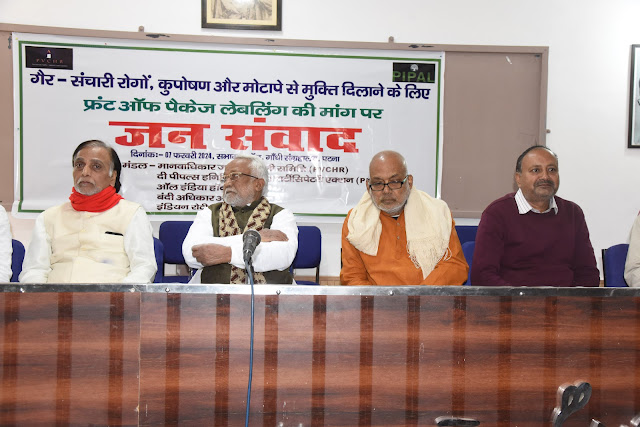NHRC Case: Protecting Youth, Women, and Children from the Hidden Dangers of Packaged Food
Diary No: 15413/IN/2021
Background
On 14 September 2021, human rights defenders Shruti Nagvanshi and Shirin Shabana Khan filed a complaint with the National Human Rights Commission (NHRC) highlighting a critical but often overlooked public health issue: the alarming rise of Non-Communicable Diseases (NCDs) in India, largely driven by packaged food high in salt, sugar, and fat.
The complainants urged NHRC to intervene for the implementation of a Nutrient Profile Model (NPM) and Front-of-Pack Labeling (FOPL) regulations to empower consumers with transparent information and push the food industry towards healthier practices.
Why It Matters
-
NCDs like obesity, diabetes, and hypertension are now the leading cause of death and disability in India.
-
Children and young people are increasingly exposed to unhealthy processed foods, making them vulnerable to lifelong health risks.
-
Without clear and simple nutritional labeling, consumers are unable to make informed choices about what they eat.
This issue is not just about food—it is directly linked to the Right to Life and Right to Health, protected under the Constitution of India.
NHRC’s Intervention
Recognizing the urgency, the NHRC took cognizance of the matter on 11 October 2021 and issued a notice to the Ministry of Health, Government of India. Over the years, the Commission has repeatedly followed up with the Food Safety and Standards Authority of India (FSSAI).
Timeline of Key Actions
-
31 May 2023: NHRC directed that expert recommendations from IIM Ahmedabad and scientific panels be considered by FSSAI while framing regulations.
-
17 August 2023: FSSAI informed NHRC that an Expert Committee was constituted to review comments and finalize recommendations.
-
21 March 2024: NHRC directed submission of the Expert Committee’s report within eight weeks.
-
July–Oct 2024: Multiple reminders were issued as reports remained pending.
-
16 April 2025: NHRC finally issued a notice to the Joint Director, FSSAI, demanding clarity on whether the Expert Committee’s report has been processed and its outcome shared.
The Larger Picture
This case highlights the slow regulatory response to a major public health crisis. While civil society has raised concerns and NHRC has intervened consistently, bureaucratic delays in finalizing Front-of-Pack Nutrition Labeling (FOPNL) continue to put millions at risk.
The victims here are not just individuals—they are entire generations of youth, women, and children across India. Ensuring transparent labeling and healthier food environments is essential to safeguard public health and human rights.
Way Forward
-
Urgent Notification of FOPNL: FSSAI must finalize and enforce clear front-of-pack nutrition labels that are simple and universally understandable.
-
Public Awareness Campaigns: Communities should be educated about the risks of high sugar, salt, and fat intake.
-
Industry Accountability: Food companies must be held responsible for prioritizing profit over health.
-
Stronger Human Rights Lens: Nutrition and food safety must be recognized as integral to human rights and justice.
Conclusion
The NHRC case 4227/90/0/2021 is a reminder that the right to health begins with the right to know what we eat. Advocacy from grassroots leaders like Shruti Nagvanshi and Shirin Shabana Khan, combined with regulatory action, can pave the way for a healthier future for India’s most vulnerable—its youth, women, and children.
Link for details about the latest order of NHRC: https://www.scribd.com/document/902306380/NHRC-Case-Protecting-Youth-Women-and-Children-from-the-Hidden-Dangers-of-Packaged-Food




Comments
Post a Comment